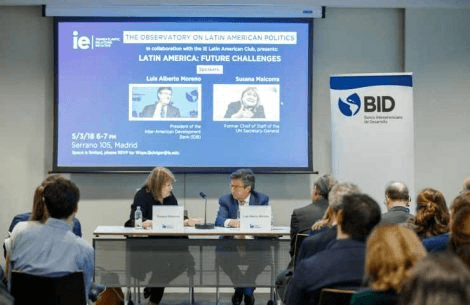Observatory on Latin American Politics: Future Challenges with Luis Alberto Moreno

Amid the profound societal changes Latin America has been experiencing, the region’s middle class nearly doubled in size over the past decade, this year is also seeing many political transformations take place. Most significantly the upcoming presidential elections in the three biggest countries in the region —Brazil, Colombia, and Mexico— with populism closely linked to all, as well as the political changes that have taken place in others as Cuba or Peru. The president of the Inter-American Development Bank (IDB), Luis Alberto Moreno, visited IE School of Global and Public Affairs in May, to give his take on the political, economic and social happenings in Latin American and the Caribbean.
From the get-go Moreno dived into an overview, looking at the trend lines and the set of challenges the region faces as a whole for economic development. The president of the IDB, a Colombian national, strongly advocated for greater trade and the need for better capacity to integrate the region in a more efficient way. “We have over 33 trade agreements in the region and we would benefit from a stronger coordination to become a major regional player. For example integrating regional trade blocs like Mercosur and the Pacific Alliance has a lot of support and could bring many benefits” he said. In fact, he suggested the idea that Latin America and the Caribbean should follow Europe’s integration path.
The event was part of the Observatory on Latin American Politics within the Transatlantic Relations Initiative (TRI) launched this year. Susana Malcorra, former Foreign Minister of Argentina, who chairs the Observatory, led the conversation with Moreno who identified a few other major challenges the region faces. “The issue of low productivity, which is especially significant vis à vis Asia, shows that we need strong investment in infrastructure and human capital. Latin America cannot miss the technological revolution given that the region missed the industrial revolution.” Moreno said.
He published an article on the matter in the World Economic Forum titled: How tech can fight corruption in Latin America and the Caribbean. Other challenges he spoke about were the huge inequality levels in the region “which explains the populism we have” as well as crime and corruption “Issues that are present on the streets and that people are truly concerned about” he said.
Luis Alberto Moreno was first elected president of the IDB, the main source of development funds for Latin America and the Caribbean, in 2005, and re-elected in 2010 and 2015. Since, his aim to foster economic integration, and the convergence processes that accompany it, has driven the multilateral bank’s mission. For example, “We are not sharing when it comes to electricity we are not sharing our grids; we need financial integration in many areas like pension funds, especially with what is happening with fin tech, and deepen our capital markets regional assimilation” Moreno said.
This was the second round table of the Observatory after, the inaugural event with Rebeca Grynspan, Secretary General of the Ibero-American Conference and Enrique Iglesias, former Secretary General of the Ibero American Conference, held in March. As the School of International Relations, the Observatory will continue to grow in prominence as a center for reference on Latin America as well as in importance to the International Relations field in Madrid. “We are in an unique time. How Nafta is renegotiated will determine a lot of our future. Also, once the cycle of elections when we will have a better picture of the region” he stated with a look of optimism.
After the event, The Presdient sat down with Dean Manuel Muñiz to talk further on the issue.
